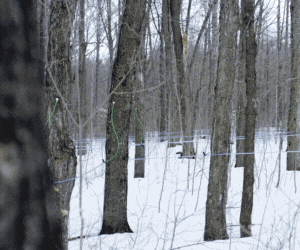BACK TO HOME
UVM Proctor Page
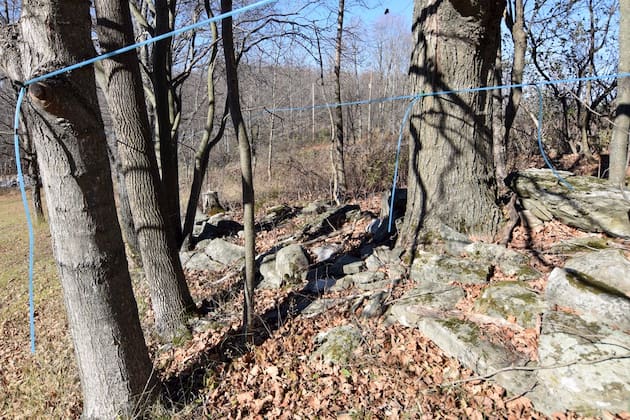
Vermont researchers downplay fall tapping
Peter Gregg | November 10, 2020
UNDERHILL CTR., Vt.—Thinking about tapping this fall? Don’t bother.
That’s the message from Abby van den Berg, a research scientist at the Proctor Maple Research Center in Underhill Center, Vt. who hosted a compelling webinar on the topic last month.
“Generally speaking from a yield perspective, the data suggests fall tapping is not the best idea, especially factoring in all the extra things involved,” she said.
Dealing with extensive freeze and thaw cycles, tapping five feet in the air to account for winter snows in northern regions were just two of the big hassles that come with tapping extra early.
[ MORE ]
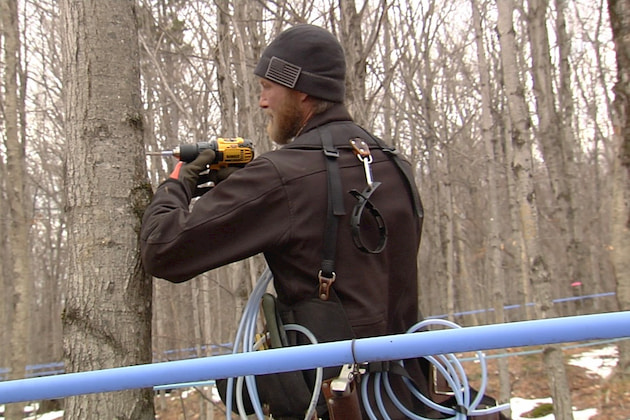
Stay away from the dead wood when tapping say Vermont researchers
Paul Post | October 20, 2020
UNDERHILL CTR., Vt.—Stay away from the dead wood.
Sugarmakers should maintain a large amount of clean, conductive wood in their trees, which will make sure the tree has a functional water transport system and is at relatively low risk of disease and decay.
That was the message from industry expert Abby van den Berg, University of Vermont research associate professor and assistant director of the Proctor Maple Research Center.
She was the host “Tapping Practices to Optimize Sustainability and Yields,” a webinar hosted by the Virginia Tree Syrup Program last month.
“But it also means we have a high probability of hitting clean, conductive wood when we tap,” van den Berg said. “That means we’re going to maintain sustainability of yields as well.”
Promoting healthy, radiant growth of trees is the underlying basis for ensuring maple production’s long-term success and profitability. [ MORE ]
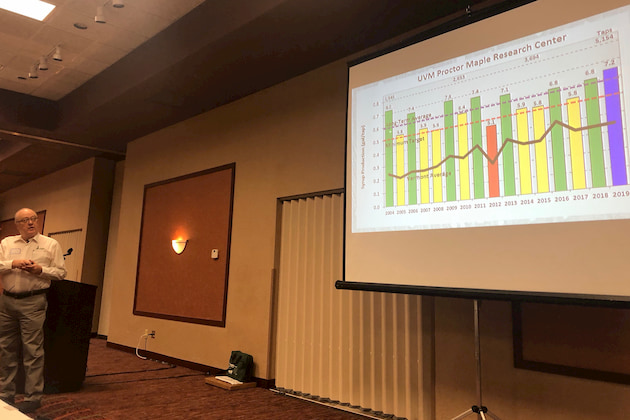
Zoom maple! UVM offering fall series of maple education seminars online
Peter Gregg | September 16, 2020
MORRISVILLE, Vt.—Time for virtual maple.
This fall University of Vermont maple specialists will will continue their series of online webinars focused on business decision-making and forestry practices.
Sugarmakers across the U.S. are invited to learn about the best ways to integrate business management and sugarbush management for a thriving maple enterprise that targets profits and forest health.
Topics will include sap yields, sugarbush forestry, tubing systems, sap-only enterprises, sugarbush appraisal and more.
[ MORE ]
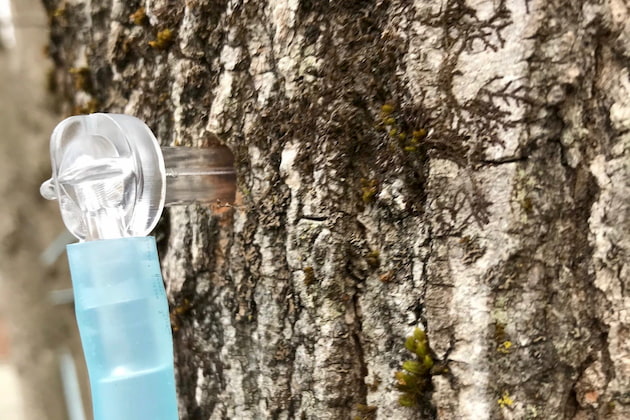
Tapholes – Straight or Slanted? The sap doesn't care
T.D. Perkins and W.T. Bosley, University of Vermont Proctor Maple Research Center | June 10, 2020
UNDERHILL CTR., Vt.—Straight or slanted? The sap doesn’t care the angle of your spout.
Historically it was recommended that tapholes be drilled at a slight angle to allow sap to run out to reduce freeze heaving of spouts and to reduce sap souring in the taphole.
Starting shortly after the introduction of the “small” spout (19/64”, 5/16”), maple equipment manufacturers started to recommend that tapholes be drilled straight in.
The most common reason for this was stated that it avoided the creation of oval tapholes. [ MORE ]
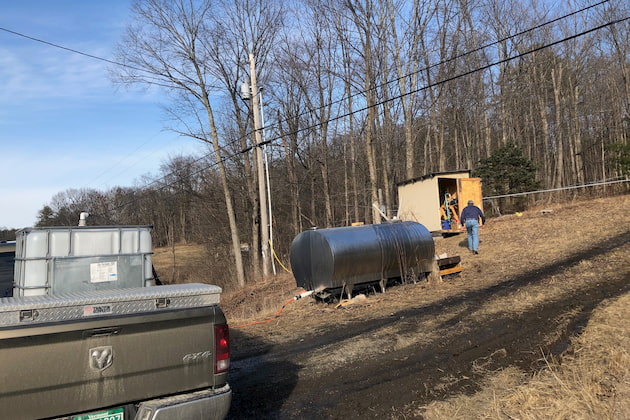
Rental rates and leases to right size your business
Mark Cannella, UVM Extension | April 14, 2020
MORRISVILLE, Vt.—Getting to at least 5,000 taps and utilizing rented trees may be the key to economic viability, according to new research from University of Vermont Extension.
Getting a maple business to a profitable scale is a primary goal for commercially-minded producers seeking meaningful income from their business.
A large equipment investment is needed to run a modern and efficient maple enterprise.
The prospect of purchasing more forestland may not be financially feasible for everyone that seeks to expand their enterprise.
Renting taps from other landowners can be a good approach to access more woods when a land purchase is not immediately possible. [ MORE ]
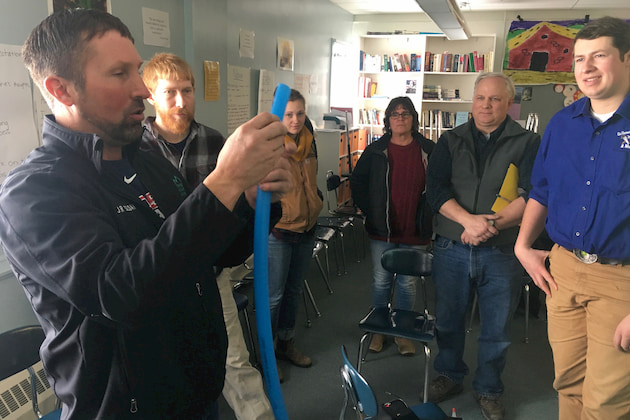
Addison County (Vermont) Maple Seminar has big class schedule this Saturday
Peter Gregg | January 9, 2020
MIDDELBURY, Vt.—The maple school season in Vermont kicks off this weekend, with a big show in Middlebury this Saturday, Jan. 11.
The 2020 Addison County Maple Seminar will be held at the Middlebury Union High School and will feature a day-long slate of classes and demonstrations for the small and big producer alike.
Walk-in registrations are welcome and the fee will be $35 for the day, including lunch (or only $20 without the lunch).
The high school is located on 73 Charles Ave. in Middlebury. The show begins at 8:00 a.m. and runs to 3:45.
The program is run by the Addison County Maple Sugar Makers Association in conjunction with the UVM Proctor Maple Research Center and UVM Extension.
Sponsors of the show include CDL USA, Co-operative Insurance Companies, F.W. Webb Company, National Bank of Middlebury, Vermont Economic Development Authority (VEDA). [ MORE ]
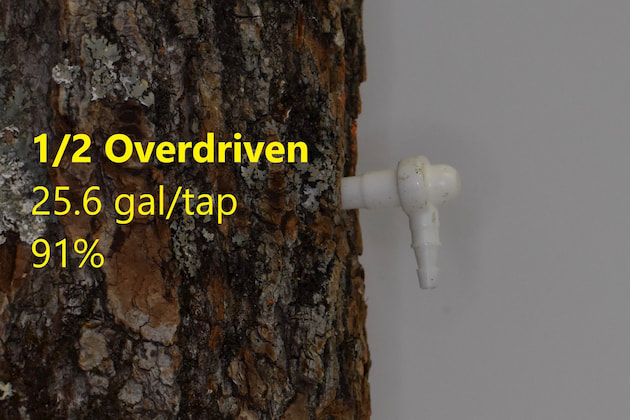
The Goldilocks Touch
T.D. Perkins, W. T. Bosley and A.K. van den Berg | November 6, 2019
UNDERHILL CENTER, Vt.—One of the more common questions producers have when about tapping maple trees is “how deep should spouts be driven in to the taphole?”
Unfortunately, there is not a simple answer, since different spouts have different dimensions, variable degrees of taper and steps and are made of different materials with dissimilar degrees of “stickiness.”
Regardless, the importance of driving spouts in to the proper depth is readily apparent: if spouts are driven too shallow there is a risk that spouts can leak vacuum or heave easily during freezes, but if driven too deeply, small cracks may form which cause liquid and vacuum leaks or alternatively, the reduced amount of exposed wood surface area inside the taphole caused by driving spouts in too deeply may reduce sap collection.
Most frequently, producers drive in spouts by sound – a change to a “deader” sound indicating proper depth. However some producers feel that seating spouts more deeply than this lowers the chance that spouts will heave and cause leaks and a loss of vacuum, therefore reasoning that deeper spout seating reduces maintenance during the season. [ MORE ]
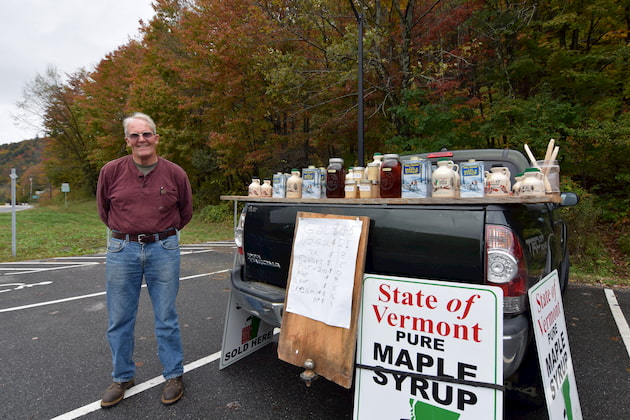
Price-Setting for maple sales
Mark Cannella | October 16, 2019
MORRISVILLE, Vt.—Prime-time maple retail season is picking up! It is time to welcome leaf peepers into our glorious northern woodlands, gear up for holiday sales and revisit price points for local demand.
I have worked with dozens of maple producers and retailers in recent years. Everyone wants to make more money and smart price-setting strategies are the key to meeting financial objectives.
It is common for people to scoff at a neighbor who apparently prices dooryard maple gallons too low. Who is selling syrup for $35 per gallon?
It is increasingly common for people to scoff at that new business selling pints online for $22+ in fancy glass bottles (aka expensive glass!). Whatever! Stop judging others and double-down on your own pricing strategy. [ MORE ]





















